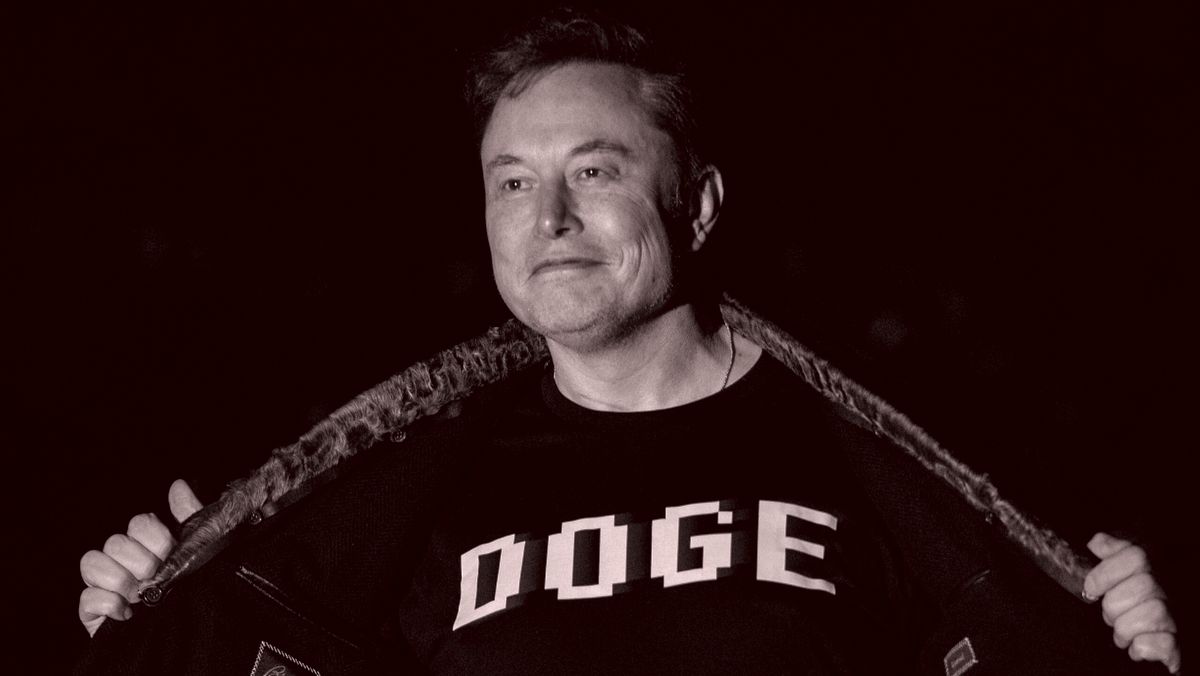Hello and welcome back to The Best & The Brightest. I’m Leigh Ann
Caldwell, here to close out your weekend and prepare you for the chaos ahead. Congress is out this week, but let me know if you’re around and we’ll grab a cup of coffee—or something stronger, if you need it.
In tonight’s issue, I’m taking a look at the status of Elon Musk. There’s been a lot of reporting about his diminished role inside the White House, but he’s losing a bit
of luster on Capitol Hill, too, as Republicans are shrugging off threats of Elon-funded primaries.
But first…
|
- Trump’s
new budget blueprint: House fiscal conservatives said they’ve extracted promises from Speaker Mike Johnson, Senate Majority Leader John Thune, and President Donald Trump in exchange for their votes last week for the budget framework that will eventually encompass legislation for tax and spending cuts. But the commitments seem to be riddled with loopholes.
A source sent me a one-page bulleted sheet that the White House gave to
hardliners Friday night, which discussed “meaningful steps to reduce spending and the deficit … to the fullest extent possible”—a phrase that commits to very little. The remainder of the text is also short on firm commitments, which suggests that it was written to avoid angering any particular faction of the party, and indicating how hard it will be to coalesce around the details.
Nevertheless, the document says the final bill will cut “at least $1 trillion” from the federal budget.
But that is far less than the minimum $1.5 trillion in cuts the hardliners are demanding. It lays out targets including Medicaid (with savings to come via tightened work and eligibility requirements, and ending “Medicaid money laundering”); Biden’s student loan forgiveness program; “federal employee benefits”; as well as SNAP and other welfare programs. The memo also claims that the renewable energy tax credits from the Inflation Reduction Act will be repealed “to the fullest
extent possible.” (The IRA is a key target for most Republicans and Trump, but a group of House and Senate Republicans whose districts have benefited from the investments have said they are opposed to a repeal, another issue already causing intraparty tension.)
Rep. Jodey Arrington, the Texas Republican chair of the Budget Committee, held a call with reporters on Friday to reinforce Johnson’s commitment that the final product will be deficit neutral at a minimum. “At some
point you have to just trust your leadership,” he said.
- Spiked stocks: Democrats are calling for investigations into whether administration officials, Trump allies, and Republican members of Congress profited off the stock market volatility surrounding the president’s whipsawing tariff announcements, particularly his social media post that instructed investors, “This is a great time to buy!!!”—just hours before calling off most of the retaliatory
tariffs, at which point stocks rebounded (for a bit, anyway). Dems want the S.E.C., the Office of Government Ethics, and congressional Republicans to get involved.
The likelihood that Trump’s administration will investigate itself is virtually nonexistent. But as Democratic leader Hakeem Jeffries pointed out, members of Congress are required to disclose their stock trades. “People are going to have to pay the piper in terms of disclosure,” Jeffries told reporters late
last week. “And so our point is, you might as well get it out into the public domain now, because it’s coming later, and there’s nothing that you can do about it.” Democrats want an investigation specifically into Rep. Marjorie Taylor Greene’s stock trades from that day.
- Tarrified: Trump administration officials fanned out on the Sunday shows to defend the president’s chaotic tariff policy, which now includes levies on 100 countries, a
145 percent tax on China, and exemptions for electronics, smartphones, and computers, etcetera. Their messages, however, weren’t always entirely cohesive or convincing.
Commerce secretary Howard Lutnick said on ABC’s This Week that the exemption on electronics is just temporary, and that an additional “special focused type of tariff” on semiconductor products will be “coming in a month or two.” Trade advisor Peter Navarro said tariffs aren’t
really the problem. “The big problem we have are the non-tariff barriers, the currency manipulation, the dumping, the VAT taxes, all of that stuff that we have no defense against other than tariffs right now,” he said on NBC’s Meet the Press. He also referred to the opening of negotiations with North Korea, not South Korea, before Kristen Welker politely corrected him.
Meanwhile, National Economic Council director Kevin Hassett said
on CNN’s State of the Union that 130 countries have come to the table, “and they’ve got their rate down to 10 percent.” And Ag Secretary Brooke Rollins said on Fox News Sunday that farmers and ranchers should know that “we are hopefully in a short period of uncertainty” that would lead to “unprecedented” prosperity. Meanwhile, as my partner Bill Cohan has
noted, this spin hasn’t done much to erase concerns in the bond market.
|
|
|
With the handy defeat of Elon Musk’s millions in a Wisconsin Supreme Court race, and his
declining popularity, Hill Republicans are finding less to love—or fear—from Trump’s wealthiest sidekick.
|
|
|
When Elon Musk first incepted the so-called Department of Government
Efficiency, Capitol Hill Republicans flocked to him like disciples to some kind of cost-cutting, bureaucracy-dismantling messiah. They filled the largest theater on Capitol Hill to attend his introductory talk, waited in line to ask him questions, and offered up their cell phone numbers for a direct line to the coolest guy in the government. They flew to Mar-a-Lago in hopes of snagging a meeting with him. Here, many thought, was the answer to their prayers of fiscal restraint, the herald of a
new political golden age.
But their golden age ended quickly. Musk contemptuously cut important government programs in lawmakers’ districts, forcing them to call and plead for the reinstatement of funds that Congress had already appropriated. He threatened to fund primaries against members who might possibly vote against Trump’s agenda, even strong supporters of DOGE. (In one early test of his power,
Musk used his America PAC to run digital ads against Iowa Sen. Joni Ernst for having the temerity to question whether Fox News weekend host Pete Hegseth should run the Defense Department. Ernst quickly changed her tune.) The world’s wealthiest man told lawmakers he would keep a “naughty list and a nice list” of Republicans, depending on how supportive they were of DOGE and Trump’s agenda, Rep. Marjorie Taylor Greene
said.
While the threat of Musk’s money may have influenced some votes in Congress, his largesse fell spectacularly short at influencing actual voters in Wisconsin’s state supreme court race earlier this month. Musk and affiliated groups reportedly
spent more than $20 million backing conservative judge Brad Schimel for the seat, only to see him lose by double digits to the Democrat-backed Susan Crawford, preserving the liberal majority on the top court of a
key swing state. Chuck Schumer celebrated by declaring that “democracy is not for sale”—despite the significant involvement
of Democratic mega-donors including JB Pritzker and George Soros, albeit more subtly than Musk.
But some Republicans were quietly relieved, too, I’m told. Maybe the wrath of Musk wasn’t so scary after all. “I don’t really begrudge Elon being involved,” Rep. Don Bacon, a centrist Republican from a swingy district in Nebraska, told me. “I’m at the point now
where I have thick skin calluses. I just try to do what’s right.” A source who works closely with Republicans told me the episode made some in the party less fearful of breaking with Trump.
Indeed, ever since that episode, subtle cracks have been showing in Trump’s control of the party. Shortly after the president’s “Liberation Day” announcement, seven Senate and three House Republicans backed a bill to reassert
congressional control over the imposition of tariffs, and more than a dozen hardline House Republicans withheld their support for the budget framework for tax cuts until they received assurances on deficit reduction from Trump and Republican leaders. A groundswell of dissent this surely is not, but in the context of Trump’s Republican Party, it qualifies as a mini-rebellion.
|
There are countless variables feeding the schisms in the G.O.P.: market dislocations,
blowback for American farmers, ideological divides over the benefits of free trade, confusion over the administration’s end goals. But one of the most significant inputs is the declining political capital of Elon Musk. In just a few short months, he’s morphed from efficiency hero—albeit one who recently downgraded his government savings projections to $150 billion, a fraction of the $2 trillion he originally promised—to political liability, issuing pronouncements seemingly tailor-made for
Democratic attack ads, such as when he called Social Security a Ponzi scheme. “He’s toxic to the Republican brand,” Rep. Melanie Stansbury, a New Mexico Democrat, said when I asked progressive Democrats about it at a press conference. “And I think that’s what was revealed by the Wisconsin race.”
Hill Republicans are well aware of Musk’s plummeting popularity. Nate Silver’s
polling average shows that 53.5 percent of people have an unfavorable view of him—an 11-point jump since the turn of the year. And in a recent poll by Fabrizio, Lee and Associates, a firm founded by Trump pollster Tony Fabrizio, just 45 percent of Republicans held a
favorable view of Musk. “I think the people of Wisconsin actually said, ‘You know what, we’re the ones that get to make the decision here,’” Sen. Lisa Murkowski, who has vocally dismissed Musk’s threats, told me.
Of course, there are plenty of Republicans still defending Musk, including Rep. Thomas Massie, a Kentucky
libertarian who isn’t worried about getting crosswise with Trump, who has already vowed to find a primary opponent against him. (Massie, a principled fiscal hawk, was the only Republican to vote against the government funding bill that passed last month, and was also a “no” vote on the G.O.P. budget framework.) “I think Elon’s more principled and discerning than most high-net-worth donors, so I’m not worried that he will tilt things in the wrong direction by getting involved in elections,” Massie
texted me. “For better or worse, incumbents have a huge built-in advantage in elections, and leveling the playing field in primaries wouldn’t be a bad thing. The incumbents aren’t getting the job done.”
Musk, for his part, has repeatedly sided with Massie on social media, endorsing his view that the Republican agenda will lead to more inflation unless lawmakers can stomach much deeper cuts to government spending—including to programs that Trump has said he would preserve, like Social
Security and Medicare. The Musk/Massie situationship points to another burgeoning dynamic: Musk’s occasional ruptures with the president. Musk’s net worth has dropped by $121 billion since the beginning of the year, due in part to massive tariffs that Trump has imposed, or threatened, on nearly every country in the world. The trade war also risks becoming a significant impediment to Musk’s businesses, including Tesla, which sources critical materials from all around the world and does about a
third of its business in China.
For now, Elon has expressed his displeasure via proxies, focusing his public criticism on Trump’s trade advisor, Peter Navarro, rather than the president himself. But attacking Navarro—the advisor whose thinking on trade is perhaps the closest to Trump’s own—may be playing with fire. Musk, after all, doesn’t motivate Republicans the way Trump
does. What he does do is motivate Democrats, who successfully villainized him in Wisconsin and will continue highlighting DOGE cuts on the campaign trail for as long as they can.
Indeed, if there is anyone who would prefer that Musk remain in the White House, it’s the Democratic operatives closely tracking his unfavorable numbers. “The richest man on earth attacking the American people and trying to take over our government is deeply wrong,” Rep.
Greg Casar, the new head of the Congressional Progressive Caucus, told me this week. “People know that in their gut, and this is exactly the kind of fight that I think Democrats need to pick.”
|
Have a great night,
Leigh Ann
|
|
|
Join Emmy Award-winning journalist Peter Hamby, along with the team of expert journalists at Puck, as they let you in on the
conversations insiders are having across the four corners of power in America: Wall Street, Washington, Silicon Valley, and Hollywood. Presented in partnership with Audacy, new episodes publish daily, Monday through Friday.
|
|
|
Unique and privileged insight into the private conversations taking place inside boardrooms and corner offices up and down Wall
Street, relayed by best-selling author, journalist, and former M&A senior banker William D. Cohan.
|
|
|
Need help? Review our FAQ page or contact us for assistance. For brand partnerships, email ads@puck.news.
You received this email because you signed up to receive emails from Puck, or as part of your Puck account associated with . To stop receiving this newsletter and/or manage all your email preferences,
click here.
|
Puck is published by Heat Media LLC. 107 Greenwich St, New York, NY 10006
|
|
|
|






















